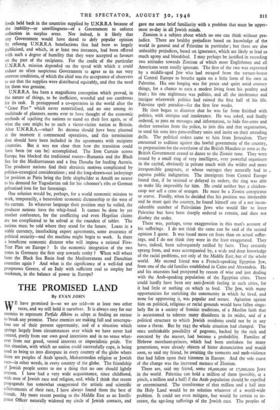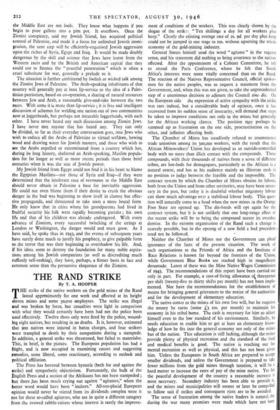THE PROMISED LAND
By EVAN JOHN
WE have promised it—so we are told—to at least two other races, and we still hold it ourselves. It is always easy for our enemies to represent Perfide Albion as adept at finding an excuse to break any promise. These enemies are making full and unscrupu- lous use of their present opportunity, and of a situation which springs largely from circumstances over which we have never had control, partly from our own good intentions and in no sense what- ever from our greed, vested interests or imperialistic pride. Yet this situation, with which no nation could successfully cope, is being used to bring us into disrepute in every country of the globe where there are peoples of Arab *speech, Mohammedan religion or Jewish race—in other words, in every country of the globe. The friendship of Jewish people seems to me a thing that no one should lightly Jettison. I have 'had a very wide acquaintance, since childhood, with men'of Jewish race and religion, and, while I think that recent propaganda has somewhat exaggerated the artistic and scientific achievements of their race, I have always found them the best of friends. My more recent posting to the Middle East as an Intelli- gence Officer naturally widened my circle of Jewish contacts, and
gave me some brief familiarity with a problem that must be upper- most to-day in all Jewish minds.
Zionism is a subject about which no one can think without pre- judice. There are healthy prejudices based on knowledge of the world in general and of Palestine in particular ; but there are also unhealthy prejudices, based on ignorance, which are likely to lead to much agony and bloodshed. I may perhaps be justified in recording two attitudes towards Zionism of which most Englishmen and all Americans seem totally ignorant. The first of the two was expressed by a middle-aged Jew who had escaped from the torture-house of Central Europe to breathe again on a little farm of his own in Palestine. His one longing was for peace and quiet amid country things, for a chance to earn a modest living from his poultry and fruit ; his one nightmare was politics, and all the intolerance and intrigue wherewith politics had ruined the first half of his life. Palestine spelt paradise—for the first few weeks.
He then began to discover that he was far from finished with politics, with intrigue and intolerance. He was asked, and finally ordered, to pass on messages and information, to hide fire-arms and shelter terrorists from the police, to join this and that organisation, to send his sons into para-military units and insist on their attending drills. The political orders came to him from Jerusalem. They amounted to sedition against the lawful government of the country, to preparations for the overthrow of the British Mandate as soon as the British Government ceased to dance to the Zionist tune. They were issued by a small ring of very intelligent, very powerful organisers in the capital, obviously in private touch with the wilder and more irresponsible gangsters, at whose outrages they naturally had to express public indignation. The immigrant from Central Europe found that, if he resisted or delayed its orders, the ring was able to make life impossible for him. He could neither buy a chicken- coop nor sell a crate of oranges. He must be a Zionist conspirator or starve. Finally, when he decided that his position was intolerable and he must quit the country, be found himself one of a not incon- siderable number of Palestinian Jews who would like to leave Palestine but have been sharply ordered to remain, and dare not disobey the order.
There was, perhaps, some exaggeration in this man's account of his sufferings. I do not think the same can be said of the second opinion I quote. It was based more on fears than on actual suffer- ings, and I do not think they were in the least exaggerated. They have, indeed, been subsequently ratified by facts. They certainly sprang from, and were accompanied by, a wide and deep knowledge of the racial problems, not only of the Middle East, but of the whole world. My second friend was a French-speaking Egyptian Jew, from one of the old families established in Cairo and Alexandria. He and his ancestors had prospered by reason of wise and just dealing with the Arab-speaking population of the Egyptian cities. There could hardly have been any anti-Jewish feeling in such cities, for it had little or nothing on which to feed. The Jew, with many opportunities for enriching the community in which he lived, and none for oppressing it, was popular and secure. Agitation against him on political, religious or racial grounds would have fallen singu- larly flat in a society of Semitic traditions, of a Muslim faith that is accustomed to tolerate many dissidents in its midst, and of a political structure to which Jewish residents could not be in any sense a threat. But by 1943 the whole situation had changed. The once unthinkable possibility of pogroms, backed by the rich and executed by the masses, had become a probability. Families of Hebrew merchant-princes, which had been unshaken for many generations, were already objects of bitter denunciation and would soon, so said my friend, be awaiting the torments and mob-violence that had fallen upon their kinsmen in Europe. And the sole cause of the change was the increased menace of Zionism.
There are, said my friend, some 16,000,000 or 17,000,000 Jews in the world: Palestine can hold a million of them (possibly, at a pinch, a million and a half) if the Arab population shoul4 be expelled or exterminated. The transference of that million and a half into the Holy Land would be no solution whatever of a world-wide problem. It could not even mitigate, but would be certain to in- crease, the age-long sufferings of the Jewish race. The peoples of
the Middle East are not fools. They know what happens if you- begin to pour gallons into a pint pot. It overflows. Once the Zionist conspiracy, said my Jewish iriend, has acquired political control of Palestine, and made it a focus for unlimited Jewish immi- gration, the next step will be efficiently-organised Jewish aggression upon the riches of Syria, Egypt and Iraq. It would be made doubly dangerous by the skill and science that Jews have learnt from the Western races and by the British and American capital that they could use to finance the "peaceful penetration" which is often a cruel substitute for war, generally a prelude to it.
The situation is further embittered by foolish or wicked talk among the Zionist Jews of Palestine. The Arab-speaking inhabitants of that country will generally pay at least lip-service to the idea of a Pales- tinian patriotism, based on co-operation, a sharing of natural resources between Jew and Arab, a reasonable give-and-take between the two races. With some it is more than lip-service ; it is free and intelligent discussion of schemes for welding one nation out of two communities now at loggerheads, but perhaps not incurable loggerheads, with each other. I have never heard any such discussion among Zionist Jews.
have never met anyone that has heard any. They can only be divided, so far as their everyday conversation goes, into Jews who wish to reduce all the Arabs of Palestine to virtual serfdom, hewing wood and drawing water for Jewish masters, and those who wish to see the Arabs expelled or exterminated from a country which has, during its long history, sheltered an Arab-speaking, Muslim popula- tion for far longer as well as more recent periods than those brief centuries when it was the seat of Jewish power.
My Jewish friend from Egypt could not find it in his heart to blame the Egyptian Muslims—nor those of Syria and Iraq—if they were determined that the 'intolerant race of revenants to the Middle East should never obtain in Palestine a base for inevitable aggression. He could not even blame them if their desire to crush the obvious danger in the bud was beginning to show itself in clumsy but effec- tive propaganda, and threatened to take soon a more brutal form He only knew that in cities where his grandparents had lived in fruitful security his folk were rapidly becoming pariahs ; his own life and that of his children was already endangered. With every advance of Zionism, every successful twitching of the strings at London or Washington, the danger would and must grow. As I have said, he spoke thus in 1943, and the events of subsequent years have surely done much to justify his prophecy, to give palpable form to the terror that was then beginning to overshadow his life. And, If his ideas seem to destroy the foundation for many noble aspira- tions among his Jewish compatriots (as well as discrediting much ruffianly self-seeking), they have, perhaps, a firmer basis in fact and common sense than the persuasive eloquence of the Zionists.



























 Previous page
Previous page